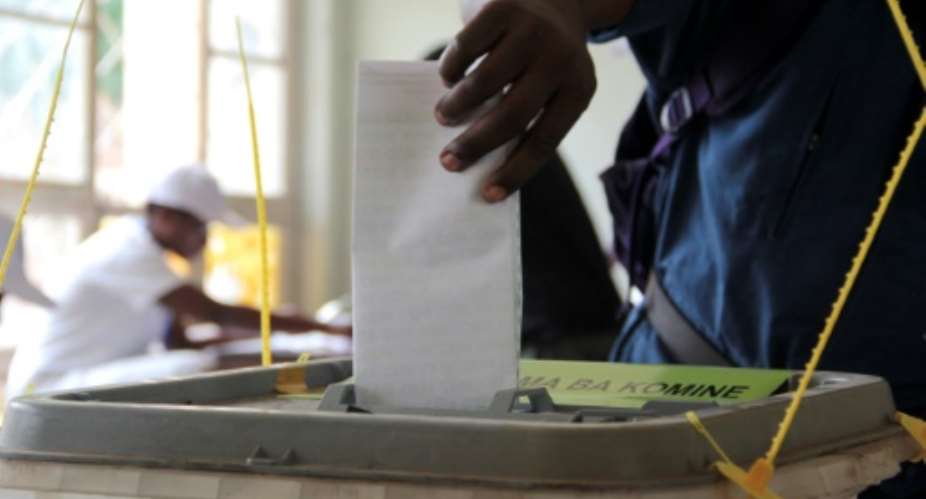Bujumbura (Burundi) (AFP) - Burundians voted Monday in controversial elections amid an opposition boycott and a string of grenade attacks, with the election commission claiming a "massive" turnout despite many stations being quiet.
Assailants threw grenades both in the capital Bujumbura and at some provincial voting centres ahead of Monday's parliamentary and local elections, delaying the start of voting in some areas, police and election officials said.
Another grenade exploded in the capital shortly after voting began in the latest example of the weeks of violence sparked by President Pierre Nkurunzizaa's defiant bid for a third term.
By midday, election commission chief Pierre-Claver Ndayicariye, said "participation was enormous throughout the country."
No official figures were available, and in polling stations in Bujumbura queues were short and turnout sparse with election officials at times outnumbering voters.
UN Secretary General Ban Ki-moon earlier called for the elections to be delayed after the opposition said they would not take part, as Burundi faces its worst crisis since civil war ended nine years ago.
The European Union on Monday condemned the decision to hold elections, saying polls "can only exacerbate the profound crisis."
Police patrolled the streets of Bujumbura, especially in opposition areas where the worst violence was seen during weeks of protests.
"Armed groups tried to attack polling centres... they were shooting and threw grenades, but the police stopped them," deputy police chief Godefroid Bizimana said.
In opposition areas, few civilians were seen at polling stations. In some stations, the lines of people queueing were mainly soldiers or police.
"The protesters closed roads to block us, but we went with the police," said Annick Niyonkuru, one of the few civilians waiting to vote in the capital's Musaga district.
Outside the capital, polling centres also appeared quiet. In the southern Bururi district, an opposition stronghold, about 10 percent of registered voters had cast their ballots by midday.
In nearby Rumonge, a more politically mixed area, turnout appeared to be around 30 percent.
- 'Sham elections' -
On the eve of the election, top ruling party official and parliament head Pie Ntavyohanyuma said he had joined some 127,000 other Burundians who have fled the country, denouncing President Pierre Nkurunziza's "illegal" bid to stay in power for a third term.
Opponents say his bid for another term is unconstitutional and violates a peace accord that paved the way for the end of 13 years of civil war in 2006. Presidential polls are due on July 15.
More than 70 people have been killed in weeks of violence and a failed coup sparked by Nkurunziza's bid to stay in power, with a string of grenade attacks in recent days.
Several top officials -- including the deputy vice-president Gervais Rufyikiri as well as members of the election commission and constitutional court -- have also fled the poverty-stricken, landlocked country.
The African Union has refused to send observers to the polls as the "necessary conditions are not met for the organisation of free, fair, transparent and credible elections."
The only international observers are those of the UN, who said that their presence should not be "interpreted as a validation" of the process.
Almost four million people are registered to vote, but the opposition are boycotting the polls, as they did in the last elections in 2010, claiming it is not possible to hold a fair vote.
Civil society groups backed the boycott in a joint statement calling on voters to skip the "sham elections" and urging the international community "not to recognise the validity" of the polls.
"This is nothing new in Burundi," election commission chief Ndayicariye countered. "In Africa, boycott is another way of doing politics."
Under the constitution, based on peace deals that ended the civil war, there are strict ethnic quotas in parliament.
Parliament must be made up of 60 percent from the majority Hutu people -- who make up some 85 percent of the population -- with the remaining 40 percent of elected seats reserved for the minority Tutsi.
Many fear a repeat of that conflict, which split the country along ethnic lines, pitting the majority Hutus against the minority Tutsis.





 Akufo-Addo spotted ordering chiefs to stand for his handshake
Akufo-Addo spotted ordering chiefs to stand for his handshake
 Akufo-Addo ‘disrespects’ every chief in Ghana except Okyenhene — NDC Communicato...
Akufo-Addo ‘disrespects’ every chief in Ghana except Okyenhene — NDC Communicato...
 Supreme Court clears way for dual citizens to hold key public positions
Supreme Court clears way for dual citizens to hold key public positions
 Be transparent, don’t suppress the truth – Prof. Opoku-Agyemang to Jean Mensa
Be transparent, don’t suppress the truth – Prof. Opoku-Agyemang to Jean Mensa
 ‘I won’t tell the world I was only a driver’s mate during challenges’ – Prof Jan...
‘I won’t tell the world I was only a driver’s mate during challenges’ – Prof Jan...
 We’ll prosecute corrupt officials of Akufo-Addo’s govt – Prof Jane Naana
We’ll prosecute corrupt officials of Akufo-Addo’s govt – Prof Jane Naana
 [Full text] Acceptance speech by Prof Jane Naana Opoku-Agyemang as 2024 NDC Runn...
[Full text] Acceptance speech by Prof Jane Naana Opoku-Agyemang as 2024 NDC Runn...
 Election 2024: Don’t be complacent, we haven’t won yet – Asiedu Nketia cautions ...
Election 2024: Don’t be complacent, we haven’t won yet – Asiedu Nketia cautions ...
 Election 2024: Stop fighting over positions in Mahama’s next govt – Asiedu Nketi...
Election 2024: Stop fighting over positions in Mahama’s next govt – Asiedu Nketi...
 Prof Jane Naana Opoku-Agyemang will restore dignity of vice presidency – Fifi Kw...
Prof Jane Naana Opoku-Agyemang will restore dignity of vice presidency – Fifi Kw...
